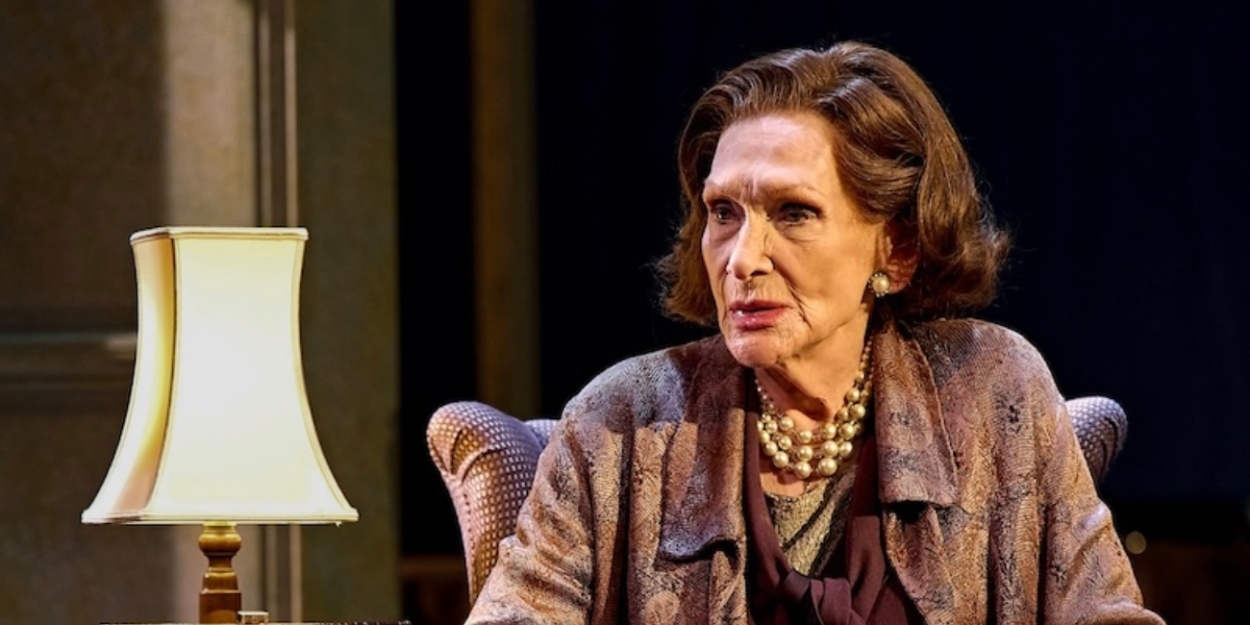Review: SUMMER 1954, Theatre Royal Bath
Sian Phillips steals the show in a twin-bill of Terence Rattigan's one-act plays at Theatre Royal Bath, starring Nathaniel Parker

![]() Siân Phillips steals the evening in Theatre Royal Bath's twin-bill tribute to Terence Rattigan's one-act plays: lesser-known Table Number Seven, and The Browning Version – hailed by critics as "a 70-minute masterpiece" when first performed at London's Phoenix Theatre in 1948.
Siân Phillips steals the evening in Theatre Royal Bath's twin-bill tribute to Terence Rattigan's one-act plays: lesser-known Table Number Seven, and The Browning Version – hailed by critics as "a 70-minute masterpiece" when first performed at London's Phoenix Theatre in 1948.
In a poignant staging by Olivier award-winning director James Dacre, who's recently launched Living Theatre Productions after a decade at Nottingham's Royal & Derngate Theatre, the pace is gentle with rumbling undercurrents.
Table Number Seven stars Nathaniel Parker (Wolf Hall and Bringing up the Bodies) as Major Pollock unmasked by fellow guests in a Bournemouth hotel as an impostor arrested for "homosexual importuning" on the esplanade. The production premiered at Manchester's Opera House, moving on to London's St James's Theatre in September, 1954.
Parker sympathetically evokes the loneliness and despair of Pollock's situation in the original version of the play set in the 1950s by Rattigan (a closet gay). The playwright altered the work to a supposedly more acceptable scenario of Pollock sexually harassing women in the cinema. This return to the earlier draft is tragically haunting.
Siân Phillips, who turned 90 last May, is totally invincible as Mrs Railton-Bell, a bottled-up dowager determined to chuck Pollock out of the hotel. Her spinster daughter Sybil (Alexandra Dowling) is conflicted, as she's struck up a friendship with the pretend major. Hotel manager Miss Cooper (an unwavering Lolita Chakrabarti) shows compassion by offering the other side of the argument.
Dacre neatly keeps up the tension, with Mike Britton's revolving set inviting us to gaze at confined spaces within the hotel that reflect stifled lives of people at a time when impropriety was unforgiven. Also, Britton's subdued palette of costumes (with the exception of Mrs Railton-Bell's commanding purple) adds to a dull and submissive atmosphere.
Several cast members reappear in The Browning Version, set in a boys' public school. Sadly, Siân Phillips isn't one of them.
Nathaniel Parker does return, however, as Classics teacher Andrew Crocker-Harris. It is believed that Rattigan based the character on his Classics tutor, JW Coke Norris, at Harrow.
After 18 years of teaching, "the Crock," as the boys call him due to his strict and humourless manner, is leaving for a badly paid job at another school. He's fighting for a pension from authoritarian headmaster Dr Frobisher (Simon Coates). And to add to his woes, his wife Millie's fallen for younger teacher, Frank Hunter, who's not in love with her.
With his career and marriage on the rocks, Crocker-Harris refers to two kinds of love – "hers and mine" – which could be Rattigan's cipher for repressed homosexuality in a repressive society. When a manuscript is lost, he says "it is lost like so many other things".
When student John Taplow (an excellent Bertie Hawes), who feels sorry for Crocker-Harris, presents him with the gift of a Robert Browning translation of Agamemnon, the Classics teacher is emboldened to examine the past and the future.
The Browning Version feels altogether more static than the first play, its lack of physicality and action hampering the audience's desire to really engage with the characters.
In addition, Chakrabarti appears to be miscast as Millie. She isn't as convincing as she might be in the role of unfaithful wife.
Everything would change for Rattigan, once deemed one of Britain's most popular mid-20th century playwrights, as audiences became unfaithful. They preferred raw, emotional, working-class "kitchen sink dramas" from Angry Young Men playwrights, such as John Osborne, Arnold Wesker and John Arden.
And yet, Rattigan's themes of repression, and fear of expressing emotion and standing up to authority still resonate today while we struggle to recognise who we are as individuals and what our place is as a country.
Summer 1954 runs at Theatre Royal Bath until November 2, then tours until February 15, 2025.
Photo credit: Manuel Harlan
Reader Reviews

Videos

